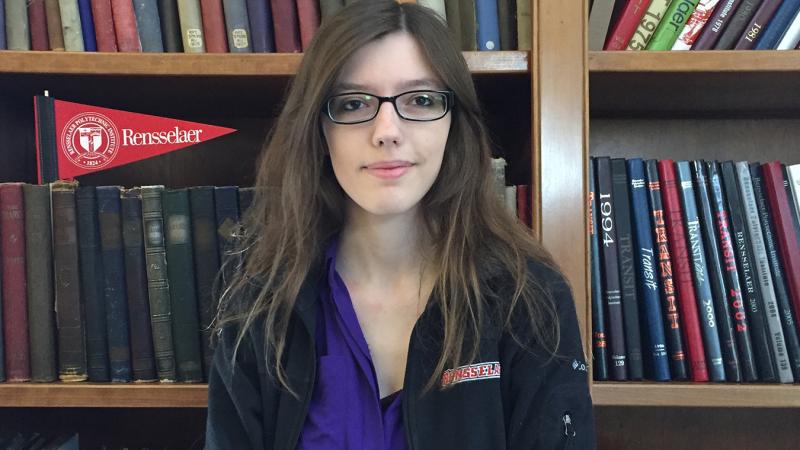A Path to Collaboration
May 11, 2017

Katelyn Fallows wants to develop new and better medicines. She came to Rensselaer Polytechnic Institute to study chemistry, believing it to be the most important science for achieving her goal. Four years later, she is graduating as a devotee of interdisciplinary collaboration, convinced through her experiences that it takes multiple vantage points to advance pharmaceutical innovation.
“At Rensselaer, I’ve worked alongside really smart people from all disciplines, and I’ve learned that there are many perspectives that are vital to fully understanding one topic,” said Fallows. “Biology, physics, chemistry, engineering – knowledge from all these fields and more goes into the goal of producing one pharmaceutical.”
Fallows will graduate with a bachelor’s degree in chemistry from Rensselaer. She will pursue a doctorate in chemistry through the University of Southern California, incorporating bioinformatics and biology in her research. Long term, she wants to be a driving force in the pharmaceutical industry.
“Drug development is a slow process; the industry struggles with finding the fastest route to the best product,” Fallows said. “I think we can use more computerized technology – computational biology and high-throughput screening – to streamline and accelerate the process.”
Fallows, who grew up in Saugerties, New York, chose Rensselaer because of its strong technical programs and the personal attention within the Department of Chemistry and Chemical Biology. It was a good fit.
“Nearly everyone at RPI wants to affect change in the world using the power of science and technology. Because of this, it’s always been easy to bond with my peers,” said Fallows. “I’m constantly inspired by the ambition around me and that is what has kept me as focused as I have been.”
While earning her degree in chemistry and chemical biology, Fallows conducted research, interned at Regeneron Pharmaceuticals in Troy, and mentored first-year chemistry students and incoming Rensselaer women. Working in the laboratory of Rensselaer Professor and department head Wilfredo Colon, she searched for a correlation between proteins that are kinetically stable -- meaning they are difficult to deactivate -- and allergies, extracting kinetically stable proteins with a unique method developed in the lab.
But she credits her outreach experience as a Science Ambassador with the most vivid lesson in the value of collaboration. Through the Science Ambassadors, run by the School of Science and the Center for Initiatives in Pre-College Education, Rensselaer students offer presentations on interesting science topics during visits to area elementary and middle schools. Fallows joined the group in her sophomore year.
“We work in groups to develop a presentation we think the kids will find interesting, and the process is very interdisciplinary,” Fallows said. “In one presentation on infectious diseases, a biologist talks about how disease is transmitted and a math major talks about exponential growth. In a presentation on sound, a physicist will explain how sound waves work, and a biologist will talk about how you hear them.”
Her experiences were reinforced during her internship at Regeneron, where she has worked alongside biologists, chemists, computer scientists, and engineers.
“I realized I don’t just want to do chemistry, I want to learn everything because you have to be well-rounded to see critical connections,” Fallows said.
Watch a video of Katelyn Fallows: https://www.youtube.com/watch?time_continue=3&v=Ow9ygxe_-WQ
Fallows’ experience is an example of The New Polytechnic, an emerging paradigm for higher education which recognizes that global challenges and opportunities are so great they cannot be adequately addressed by even the most talented person working alone. Rensselaer serves as a crossroads for collaboration — working with partners across disciplines, sectors, and geographic regions — to address complex global challenges, using the most advanced tools and technologies, many of which are developed at Rensselaer. Research at Rensselaer addresses some of the world’s most pressing technological challenges — from energy security and sustainable development to biotechnology and human health. The New Polytechnic is transformative in the global impact of research, in its innovative pedagogy, and in the lives of students at Rensselaer.
About Rensselaer Polytechnic Institute
Rensselaer Polytechnic Institute, founded in 1824, is America’s first technological research university. For nearly 200 years, Rensselaer has been defining the scientific and technological advances of our world. Rensselaer faculty and alumni represent 85 members of the National Academy of Engineering, 17 members of the National Academy of Sciences, 25 members of the American Academy of Arts and Sciences, 8 members of the National Academy of Medicine, 8 members of the National Academy of Inventors, and 5 members of the National Inventors Hall of Fame, as well as 6 National Medal of Technology winners, 5 National Medal of Science winners, and a Nobel Prize winner in Physics. With 7,000 students and nearly 100,000 living alumni, Rensselaer is addressing the global challenges facing the 21st century—to change lives, to advance society, and to change the world. To learn more, go to www.rpi.edu.